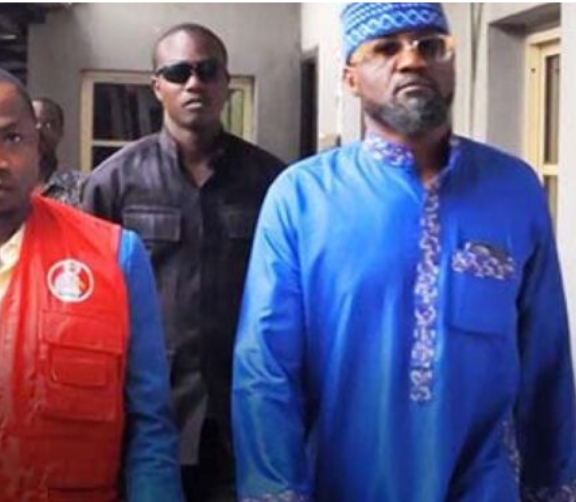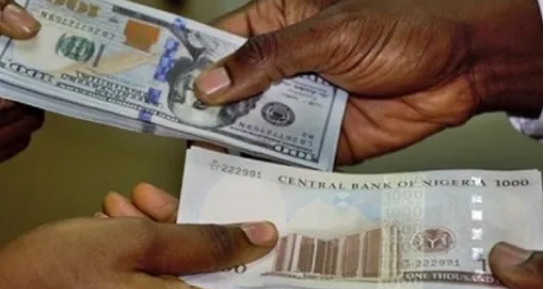News
EFCC halts dollar transactions, asks embassies to charge in naira

The Economic and Financial Crimes Commission has read the Riot Act to foreign missions based in Nigeria, banning them from transacting in foreign currencies, and mandating the use of Naira in their financial businesses.
The EFCC has also mandated Nigerian foreign missions domiciled abroad to accept Naira in their financial businesses.
The move, the EFCC noted, is to tackle the dollarisation of the Nigerian economy and the degradation of the naira
The anti-graft commission, in an advisory to the Minister of Foreign Affairs, Ambassador Yusuf Tuggar, titled: “EFCC Advisory to Foreign Missions against Invoicing in US Dollar,” expressed reservations and displeasure “regarding the unhealthy practice by some foreign missions to invoice consular services to Nigerians and other foreign nationals in the country in United States dollar(s).”
In a letter dated April 5, 2024, which was addressed to the Minister of Foreign Affairs, Ministry of Foreign Affairs, the EFCC Chairman, Ola Olukoyede expressed dismay over the invoicing of consular services in Nigeria by foreign missions in dollars.
The EFCC cited Section 20(1) of the Central Bank of Nigeria Act, 2007, which makes currencies issued by the apex bank the only legal tender in Nigeria.
The letter read, “I present to you the compliments of the Economic and Financial Crimes Commission, and wish to notify you about the commission’s observation, with dismay, regarding the unhealthy practice by some foreign missions to invoice consular services to Nigerians and other foreign nationals in the country in United States dollar ($).
“This practice is an aberration and unlawful as it conflicts with extant laws and financial regulations in Nigeria. Section 20(1) of the Central Bank of Nigeria Act, 2007 makes currencies issued by the apex bank the only legal tender in Nigeria.
“It states that ‘the currency notes issued by the Bank shall be the legal tender in Nigeria on their face value for the payment of any amount’.
“This presupposes that any transaction in currencies other than the naira anywhere in Nigeria contravenes the law and is, therefore, illegal.”
The commission added that the refusal by some missions to accept the naira for consular service in Nigeria and also comply with the foreign exchange regulatory regime in fixing the exchange of the cost of their services is not only illegal but represents an affront to the country’s sovereignty symbolised by the national currency.
Such a situation, EFCC added, undermines Nigeria’s monetary policy and aspiration for sustainable economic development.
The letter continued, “This trend can no longer be tolerated, especially in a volatile economic environment where the country’s macroeconomic policies are constantly under attack by all manner of state and non-state actors.
“In light of the above, you may wish to convey the commission’s displeasure to all missions in Nigeria and restate Nigeria’s desire for their operations not to conflict with extant laws and regulations in the country.”
When contacted for comments, the spokesperson for the EFCC, Dele Oyewale declined comments.
Meanwhile, the EFCC had resumed raiding in a bid to stabilise the naira.
Operatives of the EFCC had on Tuesday arrested some Bureau De Change operators at the popular Wuse Zone 4 market in the Federal Capital Territory, Abuja.
However, traders also said some BDC operators resisted the arrest during a sting operation.
The operatives had embarked on routine raids to sanitise the market of street traders and eliminate arbitrary trading.
But this move was resisted on Tuesday, leading to gunshots and damage to the operatives’ vehicles.
Penultimate week, the commission arrested over 35 suspected currency speculators for alleged foreign exchange fraud.
News
Court Remands P-Square’s Brother, Ex-Manager Jude Okoye IOver Alleged N1.3B, $1M, £34,000 Fraud

By Kayode Sanni-Arewa
The Economic and Financial Crimes Commission (EFCC) has taken Jude Okoye, the elder brother and former manager of the defunct music duo P-Square, to court over alleged money laundering involving ₦1.38 billion, $1 million, and £34,537.59.
Jude Okoye, along with his company Northside Music Ltd, was arraigned before Justice Alexander Owoeye of the Federal High Court in Lagos on Wednesday, facing a seven-count charge related to financial crimes.
One of the charges states: “That you, Jude Okoye Chigozie and Northside Music Ltd, sometime in 2022 in Lagos, within the jurisdiction of this Honourable Court, did directly acquire a landed property known as No 5, Tony Eromosele Street, Parkview Estate, Ikoyi, Lagos worth ₦850,000,000.00 (Eight hundred and fifty million naira) only, which money you knew or reasonably ought to have known forms part of proceeds of unlawful acts, thereby committing an offence contrary to Section 18 (2)(d) and punishable under Section 18 (3) of the Money Laundering (Prevention and Prohibition) Act, 2022.”
Another charge alleges that Jude Okoye and his company used a Bureau de Change operator to convert $1,019,762.87 (One million nineteen thousand, seven hundred and sixty-two dollars, eighty-seven cents) domiciled in Access Bank Plc into naira and remitted the funds into various accounts with the intent to conceal the source of the money, in violation of the Money Laundering Act.
Jude Okoye pleaded “not guilty” to the charges.
Following his plea, EFCC counsel Larry Peters Aso applied for a trial date and requested that the defendant be remanded in a correctional facility pending trial.
However, defence counsel Inibehe Effiong informed the court of a pending bail application and urged the court to keep Okoye in EFCC custody until the application is heard.
The prosecution opposed the request, citing congestion in EFCC facilities and urging the court to remand him to a correctional centre instead.
Justice Owoeye subsequently adjourned the case to February 28 for a bail hearing and fixed April 14 for trial commencement.
The judge also ordered that Jude Okoye be remanded at the Ikoyi correctional facility pending the determination of his bail application.
News
Funso Ayeni donates N1m, appeals to citizens to support Fisayo Aluko medical needs

By Kayode Sanni-Arewa
Prince Funso Ayeni, an Ikole born philanthropist and politician has donated the sum of N1,000,000 for the support of one Esther Fisayo Aluko Medical needs.
Fisayo Aluko, an Indigene of Ikole LGA part of Ekiti State is currently in need of fund running to millions of Naira to carry out a kidney transplant.
Prince Funso Ayeni made his support known via a Whatsapp platform created for the Indigenes of the LG.
“Good afternoon great citizens,
I am Prince Funso Ayeni (PhD)
I am deeply touched by the condition of Esther Fisayo Aluko, a young lady from Ikole Ekiti, battling kidney issue.
On behalf of myself, my family, and the entire Funso Ayeni Foundation (FAF), I have donated ₦1,000,000 (one million naira) towards her medical treatment ( receipt attached).
“I also appeal to our brothers and sisters from Ikole Local Government, both in and out of government, to rally their contacts and resources to support this urgent cause.
“Together, we can give Esther a chance to live a healthy life again.
News
Naira again falls against Dollar – February 26

By Kayode Sanni-Arewa
The naira is exchanging for ₦1,498 to 1 US Dollar at the parallel market (black market) in Nigeria.
This means that for every one dollar, you can get the equivalent in naira of ₦1,498 on February 26, 2025.
The black market rate signifies the value at which individuals can trade their dollars for naira outside the official or regulated exchange channels.
Note that the Black Market Exchange rate is typically higher than the official exchange rate because it is not regulated by the government
Today’s February 26 exchange shows that the naira has improved against the dollar, as it strengthened compared to what it traded on Tuesday, February 25, when the naira exchanged ₦1,499.
The value of any nation’s currency is determined by aggregate supply and demand.
The forces of supply and demand are themselves influenced by a number of factors, including interest rates, inflation, capital flow, and money supply.
The most common method to value currency is through exchange rates. The two main exchange rate systems are fixed rate and floating rate systems.
Investors and participants closely monitor these parallel market rates for a more immediate reflection of currency dynamics
-

 Sports23 hours ago
Sports23 hours agoChelsea emphatic win against Southampton gives them hope of top four finish
-

 Metro20 hours ago
Metro20 hours agoSHOCKING! Auto crash claims lives of groom, bride’s sister
-

 News14 hours ago
News14 hours agoCitizenship for sale as Trump announces “Gold Card” Immigration Plan, $5M
-

 News19 hours ago
News19 hours agoSenate votes to send Natasha to face Ethics committee over seat reallocation palaver
-

 News10 hours ago
News10 hours agoAmaewhule, 26 Other Lawmakers Never Defected To APC, Rivers Chair Confirms
-

 News14 hours ago
News14 hours agoSAD! Lady Loses 3-Year-Old Son Hours After Allowing Father Take Him for Weekend Visit
-

 Economy18 hours ago
Economy18 hours agoNigeria’s economy experiencing growth as GDP grows 3.84% in Q4
-

 News19 hours ago
News19 hours agoUK court orders NLNG to pay $380m over undelivered products







